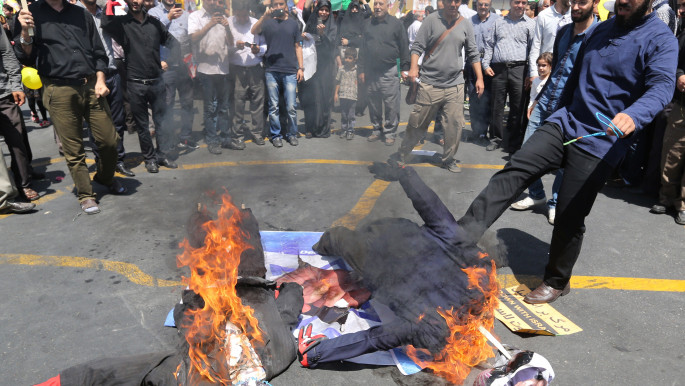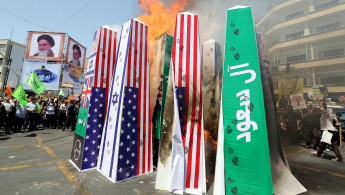Saudi Arabia joins Israel as target of Iranian protests
Tens of thousands of people attend the al-Quds (Jerusalem) Day rallies in solidarity with Palestinians, in an annual event started by Iran, as protesters also target Saudi Arabia.
3 min read
Iranian protesters burn Israeli, US and Saudi Arabian flags during the demonstration in Tehran [AFP]
Tens of thousands marched in Tehran and Baghdad Friday in annual al-Quds (Jerusalem) Day demonstrations in support of Palestinians, but Saudi Arabia this year joined arch-foe Israel as the target for protesters.
President Hassan Rouhani attended but did not speak at the main rally in Tehran, which coincided with seemingly deadlocked nuclear talks between Iran and world powers led by the United States.
In Iraq, thousands of people marched including hundreds of fighters in military uniform on Palestine Street in the capital Baghdad.
A demonstration in Lebanon was also expected to mark the annual solidarity day inaugurated by Iran's revolutionary leader Ayatollah Ruhollah Khomeini.
While Iran does not recognise Israel's existence, and supports Palestinian militant groups that fight it, Saudi Arabia's bombing campaign in Yemen drew anger.
The crowd in Tehran chanted "Down with US, Israel and the House of Saud," and carried placards that declared "Zionist soldiers kill Muslims" and "the Saudi family will fall".
While the ongoing nuclear negotiations in Vienna are at the forefront of Iranian minds, the talks were only a backdrop to the procession in the capital.
Iran's relations with Saudi Arabia have sunk in the past six months since the Sunni kingdom began a bombing campaign against the Houthis in Yemen.
Tehran also accuses Riyadh of backing Sunni extremists in Iraq and Syria, including the Islamic State group.
'Bring back our Jerusalem'
In Baghdad, protesting groups were mainly from Tehran-backed Shia factions, including the powerful Badr, Ketaeb Hezbollah and Asaib Ahl al-Haq militias.
"We tell the enemies, as long as we have this mobilisation of young men, they will not be victorious," Sheikh Khaled Mullah, a cleric and participant, told the crowd.
"We ask God to bring back our Jerusalem and cleanse the land of Iraq from" IS, he said.
As is customary for Jerusalem Day, Israeli flags had been painted on the road for demonstrators to trample as they follow the march.
A giant stick puppet dubbed Daesh - an Arabic acronym for IS - was carried through Friday's Tehran demonstration, with the words "Saudi's doll" written on it.
It was later burned along with American, Israeli and British flags, a common gesture at public demonstrations ever since the Islamic revolution of 1979.
Iran prides itself on its support for the Palestinians against Israeli occupation and state media screened the Tehran demonstration live and also aired footage of rallies in Mashhad, Isfahan and other Iranian cities.
Using a Quds Day hashtag, supreme leader Ayatollah Ali Khamenei tweeted: "There are two sides in oppression: oppressor & the oppressed. We back the oppressed and are against oppressors."
Posters showed Israeli Prime Minister Binyamin Netanyahu, Saudi King Salman and US President Barack Obama in flames.
And at a mock checkpoint, several men and a woman dressed in Israeli army uniforms shouted at people who wanted to pass and pushed them back, threatening them with batons and guns.
"We are all here to see the freedom of Quds. The people of Palestine are oppressed and their lands occupied," said Ahmad Moghadam, a 67-year-old clerk.
"We stand behind Palestine until its people are freed." Iranian military commanders also attended, with General Yahya Rahim Safavi, a senior adviser to Khamenei, saying the Quds march was different this year because of a worsening regional security situation.
Iran has backed Iraqi forces against IS and Syrian government forces against rebels including al-Qaeda affiliate Al-Nusra Front.
"Terrorist groups such as Daesh and Al-Nusra, with the support of the Zionists and Saudi's cruel war against the oppressed people of Yemen have created a new situation in the region and the world," the official IRNA news agency quoted Safavi as saying.
Fereshteh Ashuri, 23, a law student, said "We still recognise Israel as the enemy of Islam. I tell Israel to stop daydreaming and rest assured that you will collapse."
President Hassan Rouhani attended but did not speak at the main rally in Tehran, which coincided with seemingly deadlocked nuclear talks between Iran and world powers led by the United States.
In Iraq, thousands of people marched including hundreds of fighters in military uniform on Palestine Street in the capital Baghdad.
A demonstration in Lebanon was also expected to mark the annual solidarity day inaugurated by Iran's revolutionary leader Ayatollah Ruhollah Khomeini.
While Iran does not recognise Israel's existence, and supports Palestinian militant groups that fight it, Saudi Arabia's bombing campaign in Yemen drew anger.
The crowd in Tehran chanted "Down with US, Israel and the House of Saud," and carried placards that declared "Zionist soldiers kill Muslims" and "the Saudi family will fall".
While the ongoing nuclear negotiations in Vienna are at the forefront of Iranian minds, the talks were only a backdrop to the procession in the capital.
Iran's relations with Saudi Arabia have sunk in the past six months since the Sunni kingdom began a bombing campaign against the Houthis in Yemen.
Tehran also accuses Riyadh of backing Sunni extremists in Iraq and Syria, including the Islamic State group.
'Bring back our Jerusalem'
 |
|
| Protesters burn dummies depicting Barack Obama and Binyamin Netanyahu [AFP] |
"We tell the enemies, as long as we have this mobilisation of young men, they will not be victorious," Sheikh Khaled Mullah, a cleric and participant, told the crowd.
"We ask God to bring back our Jerusalem and cleanse the land of Iraq from" IS, he said.
As is customary for Jerusalem Day, Israeli flags had been painted on the road for demonstrators to trample as they follow the march.
A giant stick puppet dubbed Daesh - an Arabic acronym for IS - was carried through Friday's Tehran demonstration, with the words "Saudi's doll" written on it.
It was later burned along with American, Israeli and British flags, a common gesture at public demonstrations ever since the Islamic revolution of 1979.
Iran prides itself on its support for the Palestinians against Israeli occupation and state media screened the Tehran demonstration live and also aired footage of rallies in Mashhad, Isfahan and other Iranian cities.
Using a Quds Day hashtag, supreme leader Ayatollah Ali Khamenei tweeted: "There are two sides in oppression: oppressor & the oppressed. We back the oppressed and are against oppressors."
Posters showed Israeli Prime Minister Binyamin Netanyahu, Saudi King Salman and US President Barack Obama in flames.
And at a mock checkpoint, several men and a woman dressed in Israeli army uniforms shouted at people who wanted to pass and pushed them back, threatening them with batons and guns.
"We are all here to see the freedom of Quds. The people of Palestine are oppressed and their lands occupied," said Ahmad Moghadam, a 67-year-old clerk.
"We stand behind Palestine until its people are freed." Iranian military commanders also attended, with General Yahya Rahim Safavi, a senior adviser to Khamenei, saying the Quds march was different this year because of a worsening regional security situation.
Iran has backed Iraqi forces against IS and Syrian government forces against rebels including al-Qaeda affiliate Al-Nusra Front.
"Terrorist groups such as Daesh and Al-Nusra, with the support of the Zionists and Saudi's cruel war against the oppressed people of Yemen have created a new situation in the region and the world," the official IRNA news agency quoted Safavi as saying.
Fereshteh Ashuri, 23, a law student, said "We still recognise Israel as the enemy of Islam. I tell Israel to stop daydreaming and rest assured that you will collapse."





 Follow the Middle East's top stories in English at The New Arab on Google News
Follow the Middle East's top stories in English at The New Arab on Google News
![Israeli forces ordered bombed Gaza's Jabalia, ordering residents to leave [Getty]](/sites/default/files/styles/image_330x185/public/2176418030.jpeg?h=a5f2f23a&itok=_YGZaP1z)

